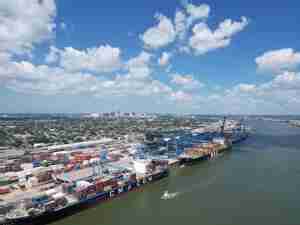U.S. Customs and Border Protection (CBP) officers at Port of Norfolk seized designer dresses and shawls estimated to be worth more than $2 million dollars, due to trademark violations.
In April, a shipment of clothing destined for Ohio was detained after a thorough examination determined the contents to be counterfeit dresses, shawls, and women's slips. A total of 1,120 garments were seized by CBP, as they violated Intellectual Property Rights (IPR) of the Louis Vuitton, Gucci, and Apple trademark. CBP Trade specialist at the Consumer Products Mass Merchandising Center determined that the counterfeit clothing if real had a Manufacturers Suggested Retail Price (MSRP) value of $2,372,490.00
"CBP is charged with enforcing trade laws, and we continue to devote substantial resources to target, intercept, detain, seize and forfeit shipments of goods that violate these laws," said Mark J Laria, CBP Area Port Director, Norfolk, VA.

IPR violations pertain to products that infringe upon U.S. trademarks, copyrights, and patents. Other violations can include misclassification of merchandise, false country-of-origin markings, health and safety issues, and valuation issues. These violations can threaten the health and safety of American consumers, the economy and national security.
CBP data indicates that handbags, wallets, apparel, footwear, watches, jewelry, and consumer electronics are at higher risk of being counterfeited. Counterfeit versions of popular brands are regularly sold in online marketplaces and flea markets.
The quality of merchandise that officers interdict in Cincinnati are inferior to the original quality sold by legitimate manufacturers. Purchasing low quality goods from online third-party sellers is dangerous and puts buyers at risk of safety hazards. CBP suggests paying close attention to the quality of the items purchased and look for misprints, cheap packaging, low quality materials used, and lower than average pricing. These are all signs that the items being purchased could be fake.
Consumers can take simple steps to protect themselves and their families from counterfeit goods:
- Purchase goods directly from the trademark holder or from authorized retailers.
- When shopping online, read seller reviews and check for a working U.S. phone number and an address that can be used to contact the seller.
- Review CBP’s E-Commerce Counterfeit Awareness Guide for Consumers.
- Remember that if the price of a product seems too good to be true, it probably is.









